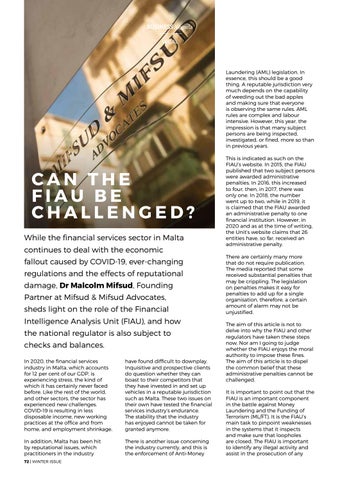BUSINESSAgenda LEGAL
Laundering (AML) legislation. In essence, this should be a good thing. A reputable jurisdiction very much depends on the capability of weeding out the bad apples and making sure that everyone is observing the same rules. AML rules are complex and labour intensive. However, this year, the impression is that many subject persons are being inspected, investigated, or fined, more so than in previous years.
CAN THE FIAU BE CHALLENGED? While the financial services sector in Malta continues to deal with the economic fallout caused by COVID-19, ever-changing regulations and the effects of reputational damage, Dr Malcolm Mifsud, Founding Partner at Mifsud & Mifsud Advocates, sheds light on the role of the Financial Intelligence Analysis Unit (FIAU), and how the national regulator is also subject to checks and balances. In 2020, the financial services industry in Malta, which accounts for 12 per cent of our GDP, is experiencing stress, the kind of which it has certainly never faced before. Like the rest of the world, and other sectors, the sector has experienced new challenges. COVID-19 is resulting in less disposable income, new working practices at the office and from home, and employment shrinkage.
have found difficult to downplay. Inquisitive and prospective clients do question whether they can boast to their competitors that they have invested in and set up vehicles in a reputable jurisdiction such as Malta. These two issues on their own have tested the financial services industry’s endurance. The stability that the industry has enjoyed cannot be taken for granted anymore.
In addition, Malta has been hit by reputational issues, which practitioners in the industry
There is another issue concerning the industry currently, and this is the enforcement of Anti-Money
72 | WINTER ISSUE
This is indicated as such on the FIAU’s website. In 2015, the FIAU published that two subject persons were awarded administrative penalties. In 2016, this increased to four, then, in 2017, there was only one. In 2018, the number went up to two, while in 2019, it is claimed that the FIAU awarded an administrative penalty to one financial institution. However, in 2020 and as at the time of writing, the Unit’s website claims that 26 entities have, so far, received an administrative penalty. There are certainly many more that do not require publication. The media reported that some received substantial penalties that may be crippling. The legislation on penalties makes it easy for penalties to add up for a single organisation, therefore, a certain amount of alarm may not be unjustified. The aim of this article is not to delve into why the FIAU and other regulators have taken these steps now. Nor am I going to judge whether the FIAU enjoys the moral authority to impose these fines. The aim of this article is to dispel the common belief that these administrative penalties cannot be challenged. It is important to point out that the FIAU is an important component in the battle against Money Laundering and the Funding of Terrorism (ML/FT). It is the FIAU’s main task to pinpoint weaknesses in the systems that it inspects and make sure that loopholes are closed. The FIAU is important to identify any illegal activity and assist in the prosecution of any
